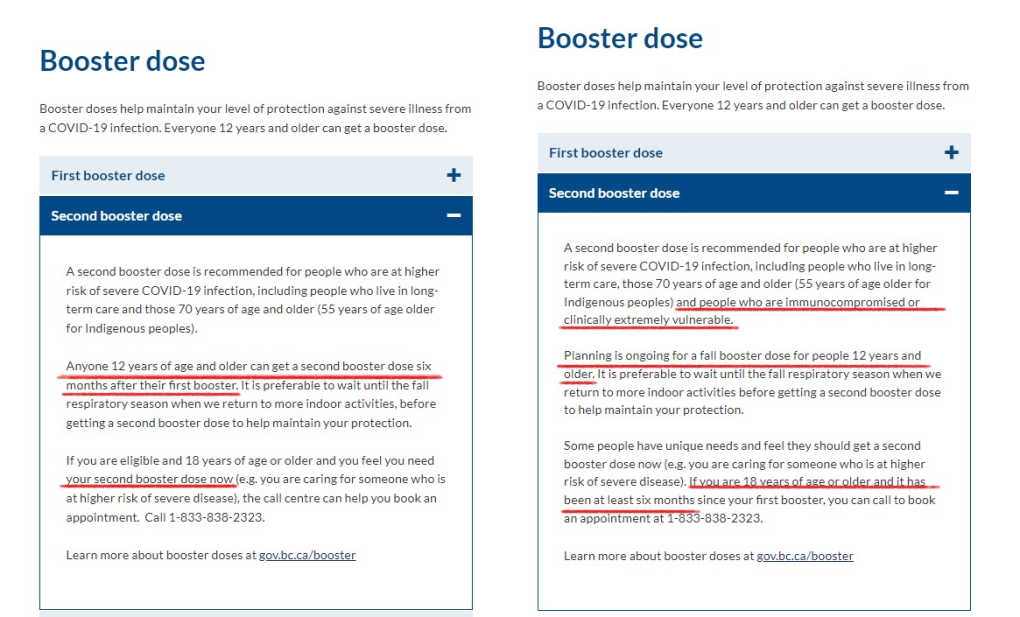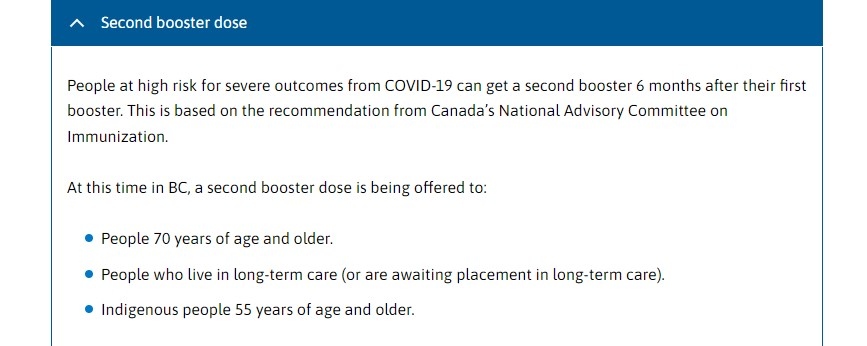COVID-19 booster confusion within B.C. public health agencies promoting conflicting information
A week after B.C.’s top health officials made a confusing announcement about a fall booster campaign and caved to public pressure to allow those who want fourth COVID-19 vaccination sooner to get them, it appears even those within the public health system are unclear about the new guidelines.
For clarity, those guidelines are: Health officials recommend waiting until September to get a second booster dose ahead of the fall respiratory illness season. However, adults who had their first booster dose at least six months ago and don't want to wait until September can call to book an appointment now.
Overnight, information provided by the Ministry of Health and the B.C. Centre for Disease Control has changed significantly, but still differs from information provided by other health agencies, including Immunize BC.
CTV News asked the Ministry of Health to clarify whether someone getting a booster dose now would be ineligible to get an updated bivalent vaccine for better protection from Omicron when such vaccines are available. CTV News also asked whether they’d be able to get one six months later, or if they would “lose” their chance at a fall booster if they get a fourth dose now.
The ministry referred CTV News to the BCCDC website, which said that “anyone 12 years of age and older can get a second booster dose six months after their first booster,” even though Friday’s announcement only referred to those 18 and older.
The site also said “if you are eligible and 18 years of age or older and you feel you need your second booster dose now.” When CTV News asked whether that meant there is no minimum wait for adults, the ministry referred back to the website and did not answer multiple phone calls and emails for clarification.
The next day, the BCCDC had quietly changed the “Second Booster dose” section of the website to new wording. It currently says: “Planning is ongoing for a fall booster dose for people 12 years and older … If you are 18 years of age or older and it has been at least six months since your first booster, you can call to book an appointment at 1-833-838-2323.”
 The old language from the BCCDC website is seen on the left, the new language on the right.
The old language from the BCCDC website is seen on the left, the new language on the right.
Meanwhile, the Immunize BC website’s section on second boosters still cites the old policy: “At this time in B.C., a second booster dose is being offered to people 70 years of age and older, people who live in long-term care (or are awaiting placement in long-term care), (and) Indigenous people 55 years of age and older.“
 The Immunize BC website's section on second boosters still cites the old policy.
The Immunize BC website's section on second boosters still cites the old policy.
SECOND BOOSTERS ALREADY POPULAR
The number of people seeking their second booster tripled week-over-week as the latest Omicron subvariant spreads rapidly and sends more British Columbians to hospital. The surge in bookings came even though many people are unaware adults can get their next shot six months after their last one, if they want it.
The Ministry of Health continues to urge people to wait until September to get their fourth shot, but many infectious disease experts say those with elevated risk or who spend a lot of time with high-risk people should consider getting second boosters sooner. All health experts, public health officials and observers agree the first booster is the most important dose, because two don’t provide the kind of long-lasting protection from serious illness they’d initially hoped.
NO DETAILS ON BIVALENT VACCINE ACCESS
CTV News has also asked who will be prioritized for bivalent vaccines, which will include targeted protection against Omicron variants. The Ministry of Health said it would be looking at incoming guidelines from the National Advisory Committee on Immunization and referred back to last week’s press conference, where the acting provincial health officer expressed optimism bivalent vaccines will be approved by health regulators soon.
“What's coming, because we also want to have a vaccine that's adapted to Omicron, because right now the vaccine we have is not adapted (to Omicron),” said Dr. Martin Lavoie. “It does make a difference, but it's going to be better to have that vaccine, and that's coming."
But many experts believe that even if approved in the fall, there will be limited initial supplies, meaning care home residents, the elderly and health-care workers will be prioritized ahead of the general public, as they’ll be furthest from their last dose and at highest risk of exposure and severe or repeated illness. That would likely mean the general public wouldn’t have access until the end of the year or early in 2023.
CTVNews.ca Top Stories

Canada Post presents union with 'framework' to reach deal as strike continues
Canada Post says it has presented the union representing some 55,000 striking postal workers with a framework to reach negotiated agreements.
'Devastating': Missing Surrey, B.C. teen found dead, family says
The family of a missing 18-year-old, who was last seen in Surrey over a month ago, says there has been a tragic end to the search.
PM Trudeau 'surprised' provinces unanimous on accelerated defence spending: Ford
Ontario Premier Doug Ford says his fellow provincial leaders are united in pushing for Canada to meet its NATO defence spending targets ahead of schedule, and that Prime Minister Justin Trudeau was "surprised" to hear it.
developing Emergency crews battle large fire at Kitchener, Ont. townhouse complex
Waterloo Regional Police say Kingsway Drive will remain closed as emergency crews continue to battle a large blaze at a townhouse complex.
Stellantis CEO Carlos Tavares resigns as carmaker continues to struggle with slumping sales
Stellantis CEO Carlos Tavares is stepping down after nearly four years in the top spot of the automaker, which owns car brands like Jeep and Ram, amid an ongoing struggle with slumping sales.
Poilievre calls for asylum seeker cap, border plan as U.S. tariff threat looms
Conservative Leader Pierre Poilievre has demanded the federal government present a plan before Parliament to beef up border security as U.S. president-elect Donald Trump threatens to impose stiff tariffs on Canada.
'Wicked' star Marissa Bode speaks out against 'harmful' ableist comments made about her character
'Wicked' actress Marissa Bode posted a video on TikTok asking for kindness after receiving ableist comments on social media.
The best tips to prepare your car for the winter
Slippery or snow-covered roads, reduced visibility and bitter cold are all conditions that can make driving difficult and even dangerous during cold weather months. CAA spoke with CTV Morning Live this week on some of the best ways you can winterize your car.
One man dead after shooting at Kitchener's 'A Better Tent City'
One man is dead after an afternoon shooting at 49 Ardelt Ave. in Kitchener.
































